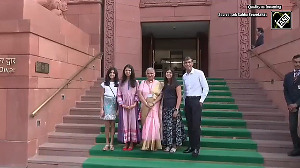Celebrity filmmaker Aparna Sen and Magsaysay awardee litterateur Mahasweta Devi on Wednesday said President A P J Abdul Kalam's decision to reject Dhananjoy Chatterjee's mercy petition is a blow to the ongoing debate on the issue.
Both are strong opponents of capital punishment.
"This is really sad. Though it must have been a tough decision for the President to make, it is unfortunate that the big debate on capital punishment was not allowed to move ahead," Sen told PTI.
But she clarified that she wants abolition of capital punishment but does not favour clemency for Dhananjoy. "He did commit a heinous crime but to kill a man because he has killed someone else certainly is not a solution," she said.
| |||||||||||
Citing the example of a 1997 case when the President had considered the clemency petition of four rape-and-murder convicts from Andhra Pradesh on her request, she said they had undergone imprisonment and were leading normal lives with their families today.
She has another question. "If Chatterjee was to he hanged, why was he left to languish in the jail for 10 years before the matter was considered worth taking note of?"





 © 2025
© 2025